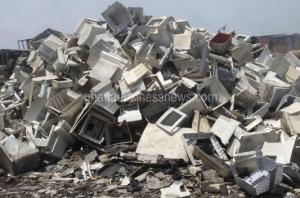Germany funds granulator to reduce burning of cables at Accra’s e-waste dump

A cable granulator – a machine for recycling copper wire – is to be inaugurated at Kwabenya in the Ga East District on the outskirts of Accra. The equipment would be used to reduce the burning of cables at the e-waste dump at Agbogbloshie in Accra.
The cable granulator, which is to be inaugurated on January 14, 2016, by City Waste Management Company Ltd, is financed by the German Embassy in Accra and is seen by the Embassy as “a first step to environmentally compatible and sustainable dismantling of electronic waste.”
This development precedes a German-funded project on disposal and recycling of e-waste expected in 2016, and follows bilateral commitments to strengthen cooperation in waste management at the German-Ghanaian Governmental Negotiations on Development Cooperation held at Berlin in June 2015.
The German Embassy says it has since the meeting at Berlin, committed €5 million in December 2015, for a technical cooperation programme on recycling and environmentally-sound disposal of e-waste.
Pre-feasibility studies on e-waste management have also been conducted by the German Development Bank, KfW (Kreditanstalt für Wiederaufbau) and German development agency GIZ (Deutsche Gesellschaft für Internationale Zusammenarbeit) and the findings have been shared with Ghana’s Ministry of Finance and the Ministry of Science, Technology and Innovation.
The e-waste dump at Agbogbloshie is believed to be one of the biggest in the world and provides livelihood for children and adults alike who are involved in the collection and hazardous dismantling and burning of e-waste to salvage precious metal. It contributes an estimated $105 million to $268 million into Ghana’s economy.
However, e-waste is known to be hazardous; a source of cancer-causing agents and pollutants to soil and water.
A study by a combined team of German and Ghanaian scientists in the area, found traces of Polychloride Biphenyls (PCBs) and heavy metals such as Lead and Magnesium in the blood of e-waste workers sampled from the dump, with dismantlers and burners being the most prone groups.
The selected sample also showed traces of Nickel, Chromium, Cadmium and Arsenic in their urine.
According to one of the researchers, the absorption of these carcinogens could manifest in cancer and mutation in the future as well as other medical complications.
Studies of the soil in the region, have also revealed extreme pollution that continues to spread.
An assessment report of the e-waste situation in Ghana, conducted in 2011 found that 171,000 tons of e-waste reaches the country’s informal recycling sector, adding that the amount of material that reaches the formal recycling sector accounted only for 0.2%.
Meanwhile, the progress of Ghana’s e-waste bill drafted in 2012, has been held back largely by ministerial reshuffles at the Ministry of Environment, Science, Technology and Innovation which has seen four different ministers since 2012.
By Emmanuel Odonkor
